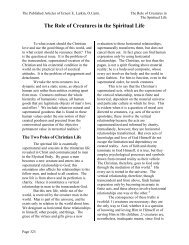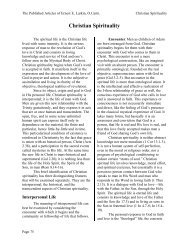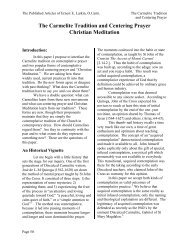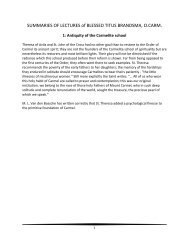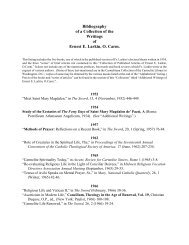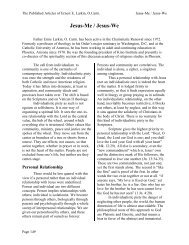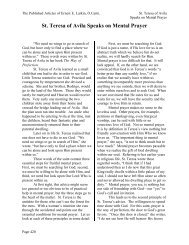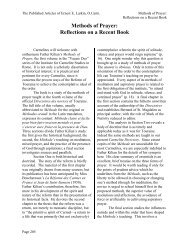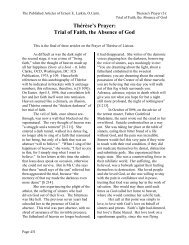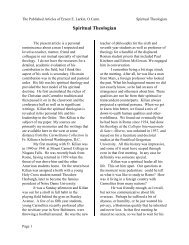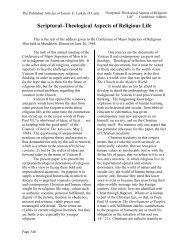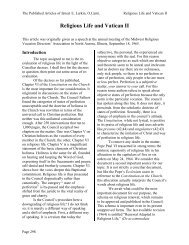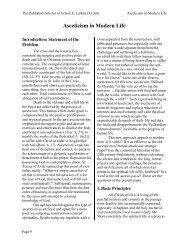Full Article - Carmelnet
Full Article - Carmelnet
Full Article - Carmelnet
You also want an ePaper? Increase the reach of your titles
YUMPU automatically turns print PDFs into web optimized ePapers that Google loves.
The Published <strong>Article</strong>s of Ernest E. Larkin, O.Carm. Prayer as Experience of God<br />
As Christians and as religious we are<br />
dedicated to living for God. A religious is one<br />
who leaves the world to live entirely for God.<br />
But what does this mean? Does it mean<br />
anything? What does it mean to know and<br />
love God, to experience him? People complain<br />
that they have no experience of God. And this<br />
is true of good Christians, even of religious.<br />
First of all, we should exclude what it<br />
does not mean. To have an experience of God<br />
does not mean to recognize God as one being<br />
alongside of many other beings. God is not<br />
that kind of reality. God is not the world or<br />
people. God is the absolute, the ground of all<br />
being. God is love, says St. John; he is life and<br />
light. And yet in spite of this transcendence,<br />
he is Father. He has revealed himself as the<br />
Father of Our Lord Jesus Christ, and it is<br />
through Christ, through our union in Christ,<br />
that we are adopted sons and say, “Abba,<br />
Father.” Christ reveals the Father, he is the<br />
sacrament of the Father, just as the Church is<br />
the sacrament of Christ. In Christ we<br />
somehow experience the infinite God who is<br />
not able to be experienced. The reason why<br />
we have such tremendous difficulty in<br />
recognizing an experience of God is because<br />
he is different, because he is totally other. The<br />
signs of his presence are part of this world, but<br />
he is the great “Beyond” in the midst of life. It<br />
is only with time and with growth that one is<br />
able to see through, to penetrate the signs in<br />
which God comes to us, the sign that is Christ,<br />
the sign that is the Church, the sign that is the<br />
Word of God in sacred scripture. The<br />
experience of God is unique. It is something<br />
that we cannot communicate, at least<br />
adequately. We can’t even communicate our<br />
interpersonal experiences to each other. These<br />
are incommunicable, subjective realities that<br />
are our own. When the Person we are relating<br />
to is the infinite God, what do we expect? We<br />
should expect to feel nothing, to see nothing;<br />
Page 258<br />
Prayer as Experience of God<br />
yet in faith we know there is a real experience.<br />
We call it the Christian experience. It is<br />
something and yet it is beyond words; it is<br />
nothing.<br />
One with God<br />
How do we know if we are in contact<br />
with God in our prayer? How do we know if<br />
we are going beyond formulas and imagery<br />
and concepts? The meeting must be beyond<br />
psychological mechanisms and on the level of<br />
the spirit, which is the very depth of our being.<br />
This is where God comes to us, even though<br />
he identifies his presence in visible signs.<br />
How do we know that we are getting beyond<br />
the signs and experiencing this God in his<br />
transcendent reality? Time Magazine recently<br />
recorded the difficulties of translating the<br />
liturgy into some native South Sea tongues. In<br />
New Guinea a typical greeting is: “I am here<br />
and you are there.” The Hail Mary is<br />
translated: “Mary, you stay right there.” Isn’t<br />
this a description of a lot of our prayers? We<br />
have been criticized for identifying God “out<br />
there” and “up there,” and so often we make<br />
our prayers, our vocal prayers and our<br />
liturgical prayers, even our meditation, as if<br />
God were a million miles out in space. This is<br />
no experience of God, even though it is words<br />
and feeling. God is not out there! God is the<br />
very ground of our being. In a sense, God is<br />
part of us, or better, we are part of him,<br />
because “in him we live and move and have<br />
our being” (Acts, 17). Through his grace we<br />
are in touch with him.<br />
Prayer must realize contact with God,<br />
otherwise it is illusion, otherwise it is selfhypnosis,<br />
or autosuggestion. But we must not<br />
judge this contact by feeling or magnificent<br />
concepts or ideas. They are no real indication<br />
that we are really at one with God, because the<br />
authentic contact is a state of being more than
The Published <strong>Article</strong>s of Ernest E. Larkin, O.Carm. Prayer as Experience of God<br />
a state of psychological experience. Real<br />
prayer is like an adult marriage relationship<br />
compared with adolescent love. Adolescent<br />
love is somewhat shallow generally, and yet is<br />
filled with enthusiasm, words, affections, and<br />
external expressions. The tried and true love<br />
relationship between married people is a real<br />
relationship. This is real contact. The forms<br />
whereby we attempt to come in contact with<br />
God are not the most important thing. What is<br />
immanent in them is more important than their<br />
appearances. Yet these forms should speak to<br />
us. This is why we have the reforms in the<br />
liturgy. The liturgy is supposed to put us in<br />
contact with God. It is the source and the<br />
summit of our encounter with God. Yet<br />
oftentimes the liturgy does not speak to us,<br />
because it is a foreign language or uses<br />
materials and expressions that don’t speak to<br />
us. Yet the important thing is that the liturgy<br />
stimulate and perfect in us the life of grace. It<br />
is not enough that we feel God “near” in our<br />
liturgical celebration or that we enjoy the<br />
sense of community. We must go beyond even<br />
these sensations.<br />
God Is Where We Find Others<br />
Our test for our prayer is the test Our<br />
Lord gave us for our love. The test is our love<br />
for each other. Ultimately, the only way of<br />
assuring ourselves that we are in contact with<br />
God is that we have developed a deep relating<br />
to one another. Cardinal Newman said this a<br />
long time ago. Many people are saying it<br />
today. God is attained by our going to him<br />
through each other, by our revealing ourselves<br />
to each other in true manly or womanly love<br />
and regard for each other. When we really do<br />
engage in deep human relationships, it is a<br />
short step to a similarly deep relationship with<br />
God. Or is it not more accurate to say that God<br />
is attained in such human relationships, even<br />
if his name is not mentioned; that Person is<br />
touched in persons? Many people today think<br />
that we experience God only in such<br />
Page 259<br />
horizontal relationships with people. God is<br />
where we find them. The only valid<br />
experience of God would be the experience of<br />
each other in common work, in common<br />
liturgy. This is truly experience of God,<br />
provided the love really goes out to the other<br />
person as person. We need not treat each other<br />
as mere signs of the Lord for this, but it is<br />
very possible not to have a supernatural,<br />
transcendental approach in our worldly work,<br />
namely, when we use others to serve<br />
ourselves, rather than place ourselves at the<br />
service of others. Only when we are acting out<br />
of charity are we experiencing God in our<br />
worldly occupations. In other words, when we<br />
are unselfish, we are experiencing God.<br />
Living the Presence of God<br />
The discussions today about the death<br />
of God theology are occasioned largely by the<br />
fact that many people are not able to<br />
experience God in their lives. “God language”<br />
means nothing to them, “God” is not real. An<br />
ethical code in imitation of Jesus is all that is<br />
possible or necessary, some think. Jesus is<br />
real, we can imagine him and especially we<br />
can imitate him. In this approach Jesus is not a<br />
person, Jesus is “a place to be” and the “place<br />
to be” is beside one’s neighbor. So the death<br />
of God theologians—or at least one of them,<br />
Dr. Hamilton—developed the ethical<br />
substitute for a very abstract and theoretical<br />
teaching about experiencing God. This is not a<br />
valid solution in our opinion. We want to<br />
imitate Christ and we do want to be realistic<br />
about the practice of charity, but at the same<br />
time we are firmly convinced that even the<br />
world-come-of-age does not exclude God or<br />
take him out of the picture. In fact, a really<br />
mature Christianity is living in the presence of<br />
God. This means living for God, acting for<br />
God and thereby in a mysterious but real way<br />
truly experiencing God.



